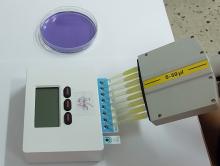The new detection system, developed through the EU-funded FOODSCAN project, is reliable and rapid and so straightforward that it can be operated by anyone. It is also convenient. The sensor fits into a pocket and can be taken out on site when it is needed. Until now, small agri-businesses have had to call a laboratory to take samples, then wait hours or even days for the results. The FOODSCAN sensor on the other hand is like a mobile phone; you simply take it out your pocket, click and read the results.
The portable biosensor, which was completed in November 2013, promises to help food manufacturers, importers, wholesalers and regulators test their supplies for pesticide contamination. This could help them avoid costly recalls and protect consumers.
For example, uncorking a bottle of wine only to find that the flavour has somehow been impaired is not just a problem for consumers; it is a serious issue for industry. One reason for this spoilage could be pesticide residue in the cork. While major suppliers are better placed to ensure the quality of their raw materials, smaller producers have in the past lacked cost-effective technology to test for contamination.
FOODSCAN has succeeded in making such testing within reach of small businesses. The project’s sensor has the potential to make pesticide testing about ten times cheaper than conventional method.
More information: http://ec.europa.eu/programmes/horizon2020/en/news/taking-pesticide-cont...










